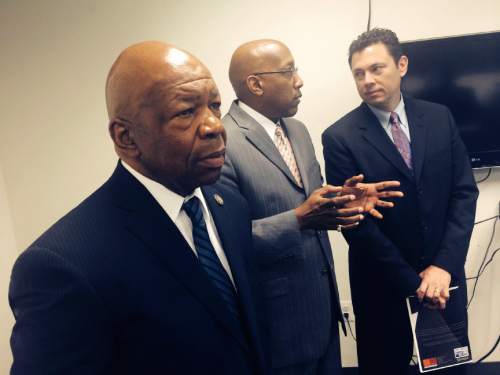This is an archived article that was published on sltrib.com in 2016, and information in the article may be outdated. It is provided only for personal research purposes and may not be reprinted.
Washington • Former U.S. presidents who leave the White House to find a new, lucrative career on the speaking circuit, with best-selling books and in the corporate boardroom could see their taxpayer-funded allowance slashed under legislation by Rep. Jason Chaffetz that was approved Monday by the House.
Former presidents now earn a $200,000 annual salary — half of what they received in the White House — and an additional $200,000 allowance for setting up an office and other related costs.
Chaffetz, a Utah Republican and chairman of the House Oversight and Government Reform Committee, says the office allowance shouldn't come out of taxpayers' wallets when most former presidents, at least those in modern times, make millions from books, speaking fees and board positions.
Maryland Rep. Elijah Cummings, the top Democrat on the Oversight Committee, co-sponsored the bill.
"This bipartisan bill recognizes the reality that most former presidents are wealthy individuals not in need of subsidies from the American taxpayer," Chaffetz and Cummings said in a joint statement. "The bill updates an arcane law and reduces unnecessary costs to taxpayers. It ends a needless government handout to former presidents making millions of dollars upon leaving office."
Under the measure, which passed the House on a voice vote Monday, a former president's allowance would be reduced dollar-for-dollar for any personal income of more than $400,000 annually. That means, in the case of all living presidents, they wouldn't get a dime.
For example, Bill Clinton's memoir, "My Life," netted him a $15 million advance. George W. Bush took in $7 million for the "Decision Points." Jimmy Carter has 14 books, and President Barack Obama is now a millionaire after the sales of his books and growth in investments.
That wasn't always the case.
Some former presidents struggled financially after leaving office. The most recent example was Harry Truman who couldn't afford to respond to all the requests and mail he received in his post-White House life. Congress passed the Former Presidents Act in 1958 to alleviate the concern of past chief executives falling on hard times.
"Some would have lived in poverty if they didn't have some help," says James Thurber, a professor of political science and director of the Center for Congressional and Presidential Studies at American University.
But since at least Ronald Reagan's departure, ex-presidents have found bountiful opportunities with books and speeches — enough that they can afford their own offices and staffs.
"There's really no need to have this allowance for them," Thurber says, calling the bill a "good idea."
Even presidential candidates who may not be wealthy now — Florida Sen. Marco Rubio and former Maryland Gov. Martin O'Malley are two examples — would, if elected, stand to make fortunes in the future. Other candidates are already set for life and wouldn't miss a $200,000 allowance.
"President Trump would not have a problem," Thurber joked.



